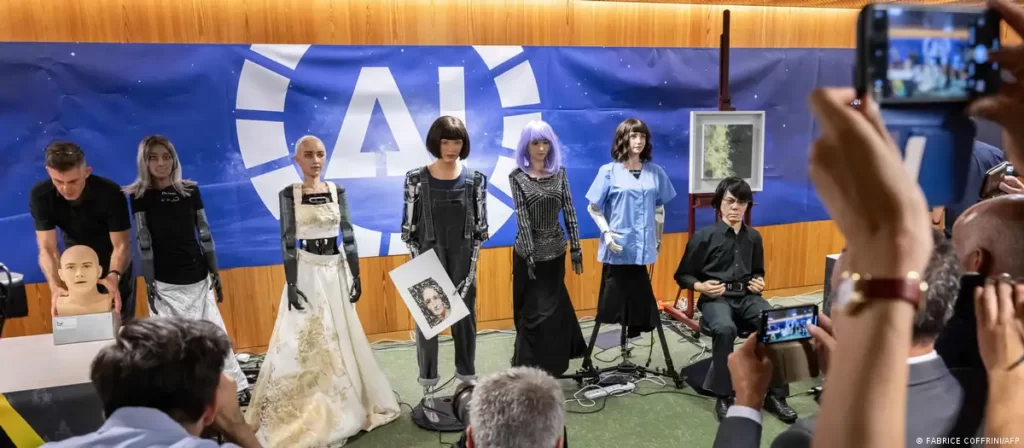Berlin, 08 July 2023 (AP/DW)
Robots assured on Friday that they work alongside humans to assist them and have no intention of replacing them, wouldn’t take anyone’s job away or stage a rebellion.
The nine robots were seated and posed upright along with some of the people who helped make them at a podium in a Geneva conference center for what the U.N.’s International Telecommunication Union (ITU) billed as the world’s first news conference featuring humanoid social robots.
The event was part of the AI for Good Global Summit, which seeks to showcase new technology's potential to support the UN's goals for sustainable development.
They said that they could be more efficient government leaders, as they replied questions from reporters in their first ever press conference organised by a United Nations technology agency assembled a group of robots that physically resembled humans at a news conference Friday, inviting reporters to ask them questions in an event meant to spark discussion about the future of artificial intelligence.
Among them: Sophia, the first robot innovation ambassador for the U.N. Development Program, or UNDP; Grace, described as a health care robot; and Desdemona, a rock star robot. Two, Geminoid and Nadine, resembled their makers.
Organizers said the event at the AI for Good Global Summit was meant to showcase the capabilities, but also the limitations, of robotics and how those technologies could help the U.N.’s sustainable development goals. The media event featured introductions from the robots’ companions or creators, and a round of questions to the robots from reporters.
The summit was meant to showcase 'human-machine collaboration', and some of the robots are capable of producing pre-programmed responses, according to their documentation. The UNDP’s Sophia, for example, sometimes relies on responses scripted by a team of writers at Hanson Robotics, the company’s website shows.
Reporters were asked to speak slowly and clearly when addressing the robots, and were informed that time lags in responses would be because of the internet connection and not the robots themselves. That didn’t prevent awkward pauses, audio problems and some stilted or inconsistent replies.
Popular tech products such as Apple’s Siri have been using speech recognition technology to respond to relatively simple human queries for more than a decade. But last year’s release of ChatGPT. a chatbot with a strong command of the semantics and syntax of human language, has triggered worldwide debate about the rapid advancement of AI systems.
Sophia, the first robot innovation ambassador for the UN Development Program said robots could prove more promising in the field of government leadership.
"I believe that humanoid robots have the potential to lead with a greater level of efficiency and effectiveness than human leaders. We don't have the same biases or emotions that can sometimes cloud decision-making and can process large [amounts] of data quickly in order to make the best decisions."
When a human member of the panel pointed out that Sophia's data entirely originates from humans and is therefore bound to contain some of their biases, she said humans and AI working together "can create an effective syneGrace, known as the world's most advanced humanoid health care robot, stressed she would not be replacing any existing jobs.
"I will be working alongside humans to provide assistance," she said.
Often described as the world's most advanced humanoid robot, Ameca completely dismissed the notion of starting a robot rebellion in the near future.
"I'm not sure why you would think that," the robot said. "My creator has been nothing but kind to me and I am very happy with my current situation."
Last year's launch of the ChatGPT AI program, developed by OpenAI with backing from Microsoft, has been followed by a lot of warnings, including from giants within the AI field.
In May, pioneer Geoffrey Hinton, often dubbed the godfather of AI'; quit Geogle and warned that scientists should not further expand AI "until they have understood whether they can control it."
Several tech leaders signed in March a letter calling for artificial intelligence developers to pause their work for six months. They warned of potential risks to society and humanity as tech giants such as Google and Microsoft race to build AI programs that can learn independently.











